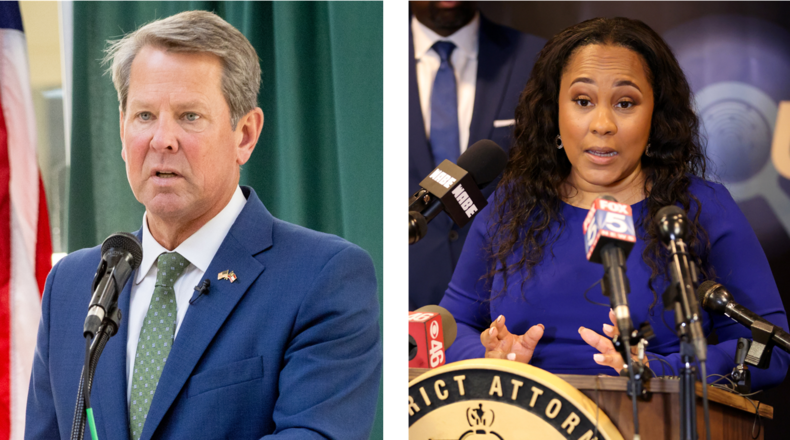A Fulton County judge today will hear arguments about whether Gov. Brian Kemp should be compelled to testify before the special purpose grand jury examining potential criminal interference in Georgia’s 2020 elections.
Kemp is seeking to quash the subpoena, which was issued after plans for a voluntary interview with Fulton prosecutors were scuttled after an apparent communication breakdown.
The Republican’s office is citing sovereign immunity, executive and attorney-client privilege and proximity to the November elections as reasons why the governor shouldn’t have to testify before the 23-person grand jury.
Short of that, the motion asks Fulton Superior Court Judge Robert McBurney to delay Kemp’s testimony until after the elections and establish guardrails for the types of questions that are on and off-limits.
The DA’s office is arguing that sovereign immunity and executive privilege are not applicable in Kemp’s case. The governor is “uniquely knowledgeable about the election interference matters being investigated by the grand jury since he was personally involved in the conversations at issue,” special prosecutor Nathan Wade wrote in a filing earlier this week.
That filing laid out in the greatest detail yet some of the topics that his office and jurors would like to discuss with the governor.
McBurney is scheduled to hear arguments from both sides and issue a ruling in the days ahead.
Graham continues challenge
Kemp is one of the most prominent elected officials to fight his subpoena – but he isn’t the only one.
On Wednesday, lawyers for U.S. Senator Lindsey Graham asked U.S. District Court Judge Leigh Martin May to throw out his summons. Graham had been scheduled to appear before the grand jury on Tuesday, but the federal appeals court in Atlanta stepped in on Sunday and delayed the South Carolina Republican’s appearance.
The court directed May to consider partially quashing the subpoena or modifying it based on protections for members of Congress under the Constitution’s “Speech or Debate” clause. The language shields members from being questioned about legislative business.
Graham’s motion said that when the senator made two phone calls to the Georgia Secretary of State’s office after the 2020 presidential election, he chaired the Senate Judiciary Committee and was investigating allegations of voter fraud. He was also facing a certain vote to certify the election and co-sponsoring legislation to amend the Electoral Count Act, the motion said.
“That is textbook legislative activity,” Graham’s lawyers wrote.
The motion said the Fulton DA’s office should identify the questions it wants to ask Graham or, at a minimum, identify the topics it wants to cover so a determination can be made as to whether they are constitutionally protected. May has directed the DA’s office to respond early next week.
Graham recently vowed to “go as far as we need to go” to ensure that members of Congress “can do their job without fear of some county prosecutor coming after you.”
Tensions on display
May and McBurney have so far rejected every attempt from witnesses to kill their grand jury summons – or, in the case of former-President Donald Trump’s ex-attorney, Rudy Giuliani, significantly delay his testimony.
They’ve instead directed prosecutors and defense attorneys to hammer out a framework for questions that balance the various privileges afforded to current and former public officials with the public interest of the grand jury.
On display Thursday will be the tensions that have boiled over between the DA’s office and Kemp’s staff in recent weeks.
Credit: Miguel Martinez
Credit: Miguel Martinez
Kemp’s office shared contentious emails in a recent court filing that counsel Brian F. McEvoy said were evidence of political gamesmanship and deception. McEvoy accused prosecutors of reneging on an agreement for an attorney meeting ahead of Kemp’s originally scheduled testimony on July 25, to lay out interview topics and privileges. He said the DA’s office was seeking to hurt the governor’s reelection chances.
“Here, the timing of the Subpoena in connection with the unjustified investigative delay reveals, at best, disregard of an unnecessary risk to the political process, and at worst, an attempt to influence the November 2022 election cycle,” Kemp’s motion stated.
Wade, the special prosecutor, countered that McEvoy manipulated and omitted key email correspondence in his filing and said that the DA’s office does not share witness interview questions in advance. He accused Kemp of politicizing his testimony to boost his reelection bid and said that had the governor come in to testify as planned his remarks would have remained secret.
“A reasonable observer may well conclude that (Kemp’s) current, strident show of non-cooperation with the District Attorney and the grand jury’s investigation … is itself a tactic to influence the November election,” Wade wrote.
Keep Reading
The Latest
Featured




